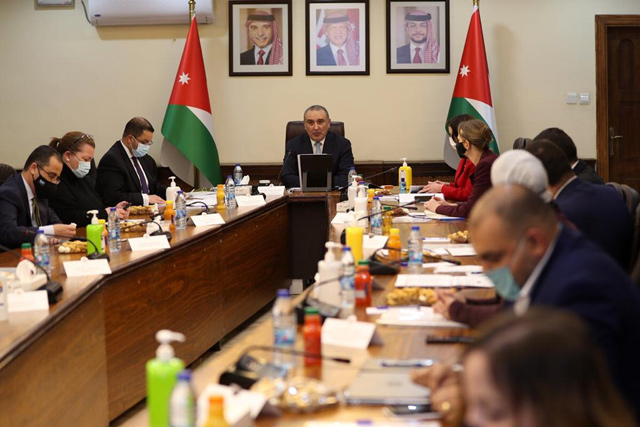AMMAN — Minister of Planning and International Cooperation Nasser Shraideh on Thursday during the third Jordan Taskforce meeting since the 2019 London Initiative highlighted the ministry’s ongoing efforts to maintain economic reform efforts.
UK Minister for the Middle East and North Africa James Cleverly met Shraideh to co-chair the meeting, which was also attended by Minister of Finance Mohamad Al-Ississ, British Ambassador to Jordan Bridget Brind, a number of international donors and representatives from the private sector, according to a Planning Ministry statement.
It covered Jordan’s progress on economic reforms under the 2018-2022 reform matrix, the Government’s Indicative Executive Programme 2021-2024, as well as current economic challenges facing the private sector as a result of the coronaviruys pandemic.
In his opening remarks Shraideh indicated that this third meeting is part of the ministry’s ongoing efforts to maintain economic reform efforts and mobilise further support from the international community to help Jordan with this next phase of reforms that are essential to stimulating growth and employment.
The minister reiterated Jordan’s commitment to the reform matrix, and highlighted that this commitment is reflected in the recently launched Indicative Executive Programme, in which the first pillar of the programme covers structural and economic reforms.
These reforms target an improvement in the business environment, developing government services and contributing to economic recovery, the statement said.
He added that the government has added two new pillars to the matrix related to government performance and tourism as additional priorities for the upcoming phase.
He described the key reforms that were completed including the “investor journey”, amendments to investment regulations for non-Jordanian investors that opened up 22 new sectors, and a new mechanism for managing government investments.
He went on to say that a new law for public-private partnership has been issued alongside a fund to finance technical and financial studies, and a number of value-chain studies on export sectors have been carried out.
The government has also moved forward with the development of a new law for guaranteeing rights in movable funds, increased measures for regulatory predictability, the issuance of new inspection laws and bylaws, a new insolvency law and regulations for the use of a government e-procurement system.
The planning minister stated: “The pandemic presented us with exceptional social and economic circumstances that required a review of the reform matrix in order to prioritise reforms that would reduce costs and time on businesses, include targeted reforms for the agriculture, tourism and transport sectors, as well as fast-track reforms that focus on improving partnerships with the private sector and increasing competitiveness.”
The taskforce meeting also focused on the government’s Indicative Executive Programme and its main pillars including structural and economic reforms, political development, digital and green economy transformation, investments and productive sectors, developing infrastructure, improving social services, reducing employment and poverty and increasing self-reliance.
The planning minister also thanked supporting governments and organisations for fulfilling the commitments that were made during the London Conference, and highlighted the importance of continuing to offer financial support during this challenging time.
He also spoke about challenges related to the hosting of a large number of Syrian refugees, which has compounded challenges facing the Kingdom.
In turn, Cleverly reflected on the close ties the UK and Jordan have enjoyed for the last 100 years and the importance of this relationship for both countries.
Cleverly said: “Jordan has delivered meaningful results on reform and financial resilience despite COVID-19 but there is more to be done to secure Jordan’s future. The UK’s relationship with Jordan remains strong and deep and we continue to support the Government of Jordan’s drive for sustainable economic growth and to build back stronger from the pandemic.”
Al-Ississ gave an update on the macroeconomic and fiscal framework indicating that COVID represented a massive fiscal and economic shock, but Jordan has weathered many of these over the years.
“Our policies cushioned a significant portion of this shock, yet the scarring is deep and felt by every Jordanian,” he said.
“Our key focus is to bring down unemployment through reigniting growth and to lower debt service costs,” the finance minister said.
He went on explain Jordan’s fiscal and structural reform agenda. “Jordan has been implementing deep structural reforms to strengthen macroeconomic stability and enhance competitiveness to enable growth, a trend that did not slow down during COVID,” he said.
On the support by the international community, Al-Ississ noted: “We value the support of our development partners, and the partnership we maintain with the IMF throughout our reform journey.”
The Jordan Taskforce meeting also covered important interventions by representatives of the donor community and the private sector, as well as presentations covering steps that have been taken to enhance the public investment and PPP framework and investment promotion.
In the meeting’s concluding remarks attendees agreed that Jordan is on an essential reform path and commended the government for taking some hard decisions despite the challenges presented by the pandemic and the pressures being placed by Syrian refugees.
They highlighted that Jordan has achieved important steps and that the international community should continue to support Jordan on its path to reform.
The five-year reform matrix (2018-2022) was prepared and launched at the London conference in February 2019, it included a set of structural reforms over a five year period. As part of the follow-up mechanism on the conference, a joint Jordan taskforce was formed (Jordan Taskforce) in coordination with the United Kingdom, donors, and the private sector.
The Taskforce meets to review results and provide advice on stimulating economic growth and monitor progress on three fronts including growth and reform, debt stabilisation, and investment. It is also tasked with following up on the support provided by the international community to finance and implement reforms.
